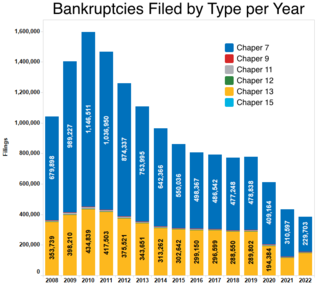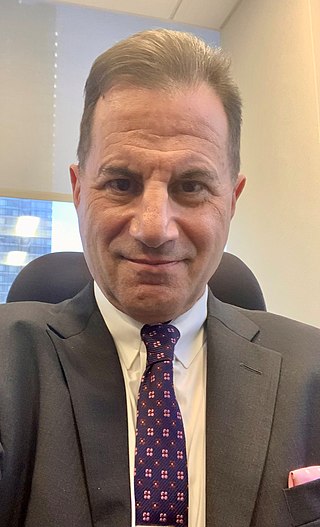Related Research Articles
Bankruptcy is a legal process through which people or other entities who cannot repay debts to creditors may seek relief from some or all of their debts. In most jurisdictions, bankruptcy is imposed by a court order, often initiated by the debtor.
Chapter 11 of the United States Bankruptcy Code permits reorganization under the bankruptcy laws of the United States. Such reorganization, known as Chapter 11 bankruptcy, is available to every business, whether organized as a corporation, partnership or sole proprietorship, and to individuals, although it is most prominently used by corporate entities. In contrast, Chapter 7 governs the process of a liquidation bankruptcy, though liquidation may also occur under Chapter 11; while Chapter 13 provides a reorganization process for the majority of private individuals.
Debt restructuring is a process that allows a private or public company or a sovereign entity facing cash flow problems and financial distress to reduce and renegotiate its delinquent debts to improve or restore liquidity so that it can continue its operations.

Trump Entertainment Resorts, Inc. was a gambling and hospitality company. The company previously owned and operated the now-demolished Trump Plaza and Trump World's Fair, the now-closed Trump Marina, Trump Casino & Hotel in Gary, Indiana, Trump 29 in Coachella, California, and Trump Taj Mahal in Atlantic City. It was founded in 1995 as Trump Hotels & Casino Resorts by Donald Trump, who after 2004 held only a minority ownership. The company filed for bankruptcy in 2004, 2009 and 2014. It became a subsidiary of Icahn Enterprises in 2016. Since then, all of the company's properties have been closed and sold.

The Hard Rock Hotel & Casino Atlantic City, formerly Trump Taj Mahal, is a casino and hotel on the Boardwalk, owned by Hard Rock International, in Atlantic City, New Jersey, United States.

In the United States, bankruptcy is largely governed by federal law, commonly referred to as the "Bankruptcy Code" ("Code"). The United States Constitution authorizes Congress to enact "uniform Laws on the subject of Bankruptcies throughout the United States". Congress has exercised this authority several times since 1801, including through adoption of the Bankruptcy Reform Act of 1978, as amended, codified in Title 11 of the United States Code and the Bankruptcy Abuse Prevention and Consumer Protection Act of 2005 (BAPCPA).
In accounting, insolvency is the state of being unable to pay the debts, by a person or company (debtor), at maturity; those in a state of insolvency are said to be insolvent. There are two forms: cash-flow insolvency and balance-sheet insolvency.
The Bankruptcy and Insolvency Act is one of the statutes that regulates the law on bankruptcy and insolvency in Canada. It governs bankruptcies, consumer and commercial proposals, and receiverships in Canada.
Bankruptcy is a legally declared inability or impairment of ability of an individual or organization to pay their creditors. In most cases personal bankruptcy is initiated by the bankrupt individual. Bankruptcy is a legal process that discharges most debts, but has the disadvantage of making it more difficult for an individual to borrow in the future. To avoid the negative impacts of personal bankruptcy, individuals in debt have a number of bankruptcy alternatives.

Trump Plaza was a hotel and casino on the Boardwalk in Atlantic City, New Jersey, owned by Trump Entertainment Resorts. Designed by architect Alan Lapidus, it operated from May 14, 1984, until September 16, 2014.
An unfair preference is a legal term arising in bankruptcy law where a person or company transfers assets or pays a debt to a creditor shortly before going into bankruptcy, that payment or transfer can be set aside on the application of the liquidator or trustee in bankruptcy as an unfair preference or simply a preference.
A general assignment or assignment is a concept in bankruptcy law in which an insolvent entity's assets are assigned to someone as an alternative to a bankruptcy. One form is an "assignment for the benefit of creditors", abbreviated ABC or AFBC.
As a legal concept, administration is a procedure under the insolvency laws of a number of common law jurisdictions, similar to bankruptcy in the United States. It functions as a rescue mechanism for insolvent entities and allows them to carry on running their business. The process – in the United Kingdom colloquially called being "under administration" – is an alternative to liquidation or may be a precursor to it. Administration is commenced by an administration order.
Debtor-in-possession financing or DIP financing is a special form of financing provided for companies in financial distress, typically during restructuring under corporate bankruptcy law. Usually, this debt is considered senior to all other debt, equity, and any other securities issued by a company — violating any absolute priority rule by placing the new financing ahead of a company's existing debts for payment.

United Kingdom insolvency law regulates companies in the United Kingdom which are unable to repay their debts. While UK bankruptcy law concerns the rules for natural persons, the term insolvency is generally used for companies formed under the Companies Act 2006. Insolvency means being unable to pay debts. Since the Cork Report of 1982, the modern policy of UK insolvency law has been to attempt to rescue a company that is in difficulty, to minimise losses and fairly distribute the burdens between the community, employees, creditors and other stakeholders that result from enterprise failure. If a company cannot be saved it is liquidated, meaning that the assets are sold off to repay creditors according to their priority. The main sources of law include the Insolvency Act 1986, the Insolvency Rules 1986, the Company Directors Disqualification Act 1986, the Employment Rights Act 1996 Part XII, the EU Insolvency Regulation, and case law. Numerous other Acts, statutory instruments and cases relating to labour, banking, property and conflicts of laws also shape the subject.
Pre-packaged insolvency is a kind of bankruptcy procedure, where a restructuring plan is agreed upon in advance of a company declaring its insolvency. In the United States pre-packs are often used in a Chapter 11 filing. In the United Kingdom, pre-packs have become popular since the Enterprise Act 2002, which has made administration the dominant insolvency procedure. Such arrangements are also available in Canada under the Companies' Creditors Arrangements Act.
The Parliament of Canada has exclusive jurisdiction to regulate matters relating to bankruptcy and insolvency, by virtue of Section 91(2) of the Constitution Act, 1867. It has passed the following statutes as a result:

Peter S. Kaufman is an American investment banker and private equity investor. He is the President and Head of Restructuring and Distressed M&A at Gordian Group LLC, an investment banking firm. He is also a Managing Partner of Bacchus Capital Management, a winery investment concern.
Bankruptcy in Irish Law is a legal process, supervised by the High Court whereby the assets of a personal debtor are realised and distributed amongst his or her creditors in cases where the debtor is unable or unwilling to pay his debts.
Insolvency law of Russia mainly includes Federal Law No. 127-FZ "On Insolvency (Bankruptcy)" and Federal Law No. 40-FZ "On Insolvency (Bankruptcy) of Credit Institutions".
References
- 1 2 3 Kolb, Robert W. (2008). Encyclopedia of Business Ethics and Society. ISBN 9781412916523.
- ↑ See Kevin J. Delaney, Strategic Bankruptcy (University of California Press, 1998) for a discussion of this phenomenon by reference to particular cases.
- 1 2 Bradleyt, Michael; Rosenzweig, Michael. "The Untenable Case for Chapter 11". digitalcommons.law.yale.edu.
- 1 2 Kurtz, Howard (24 April 2011). "Kurtz: The Trump Backlash". Newsweek . Retrieved March 25, 2024.
- 1 2 3 O’Connor, Clare (April 29, 2011). "Fourth Time's a Charm: How Donald Trump Made Bankruptcy Work for Him". Forbes . Retrieved March 25, 2024.
- 1 2 "PolitiFact - Yep, Donald Trump's companies have declared bankruptcy...more than four times".
- ↑ "Donald Trump's lawsuits could turn off conservatives who embrace tort reform". 5 May 2011.